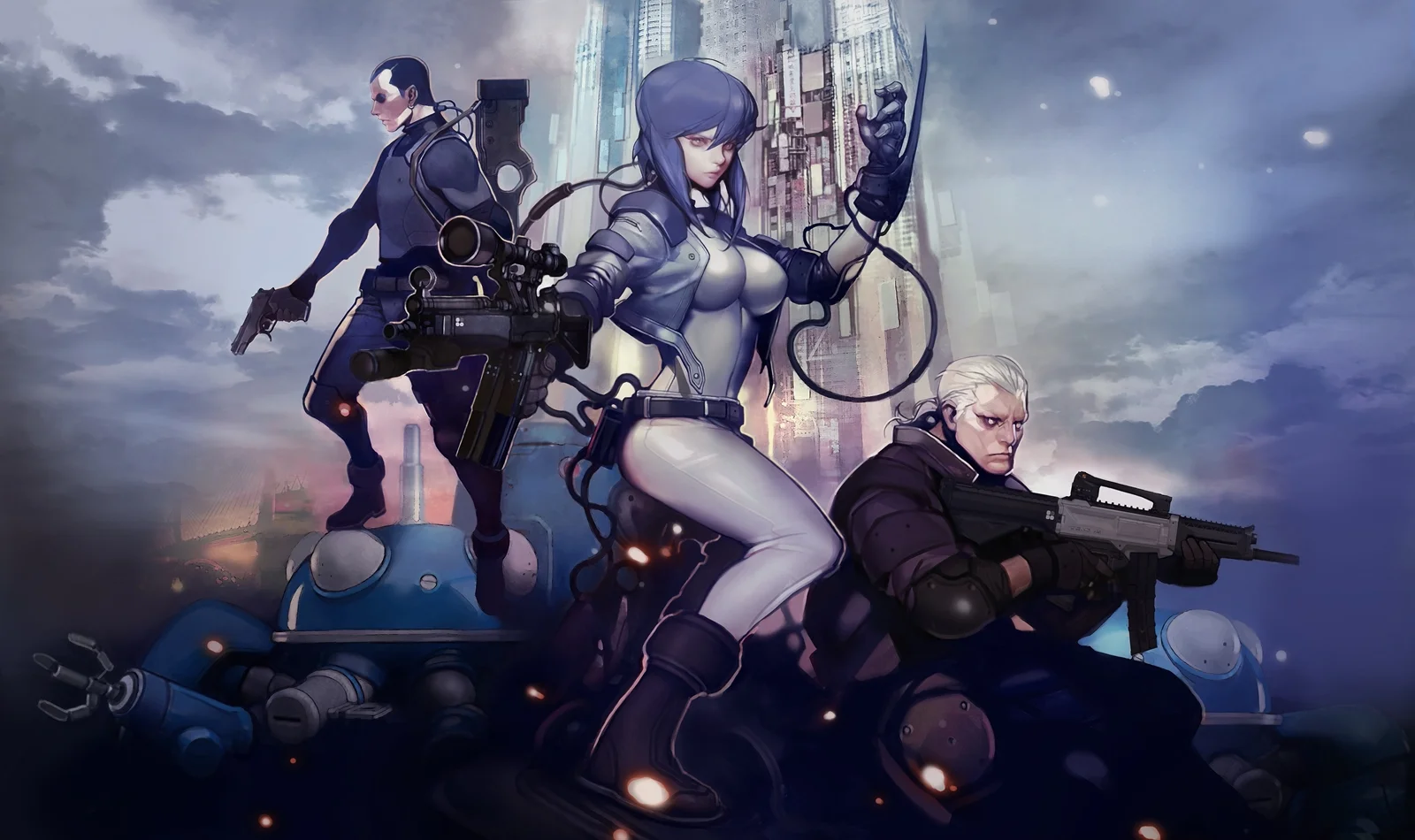The concepts of cyberpunk were introduced in the early science fiction works of the 1960s, but the genre was fully realized and pioneered in the 1984 by writer William Gibson and his groundbreaking novel, the Neuromancer. Cyberpunk is defined as: a sub-genre of science fiction in a futuristic setting that tends to focus on a combination of “low-life” and “high-tech,” featuring advanced technological and scientific achievements, such as: artificial intelligence (A.I.), cybernetics, and transhumanism. Often times there was a focus on the breakdown or radical change in the social order. For example, a dystopian society where life is controlled and oppressed by megacorporations, intrusive government, and computers. Key elements in cyberpunk also include drugs, hacking, and noir.
Credit: Ghost in the Shell, a popular Japanese anime that deals with cyberpunk
The genre skyrocketed in popularity especially in the late 90s and early 2000s when being edgy and dark were synonymous with being cool. In that period the world had seen great cyberpunk films like The Matrix or books like Snow Crash, which further cemented the genre. But as years passed there was a definite decline as people wanted to shift away from the brooding atmosphere and dreary apocalyptic ideas. Cyberpunk became stagnated.
Until now.
These days cyberpunk as a whole has been given a fresh breath of life and I’m not complaining. I love cyberpunk things. From the badass aesthetics, neon cities, and functional/fashionable clothing (which my wardrobe has evolved to match!), I am probably the biggest proponent and advocate of Team ‘Bring Back Cyberpunk.’ I’m just glad it’s happening organically.
But why? Why has cyberpunk seen a resurgence lately? I’ll tell you why:
Art is imitating life.
Credit: Blade Runner 2049 Poster by Ash Thorp
As I’m sitting here writing this in 2018, the commander-in-chief of the free world is a former reality television star and an open misogynist with a history of sexual violence. Giant corporate conglomerates like Google, Amazon, and Disney monopolize the competition and push out smaller businesses, shaking up the landscape and altering the way we consume goods. Outside of the U.S. many countries like Syria, North Korea, and China are feeling the influence and oppression of government more than ever before. Our daily lives are run and scheduled by robotic entities in the form of Siri and Alexa. Mechanical prosthetics are commonplace and abundant to those who need it due to the arrival of 3D printers. Cryptocurrency has been primed and set to replace physical forms of money! The modern world we live in is a cyberpunk dystopia. Yet many people have failed to realize it.
Credit: Upgrade
To make my point more clear, you may know a certain Marvel Comics character called the Incredible Hulk. If not, he’s that scientist guy that gets bigger and greener when angered and smashes things up (ring a bell?). But did you know the gamma-ray irradiated Hulk was made to discuss the Cold War and the ramifications of nuclear war? Or that the X-Men team were a subtle way to discuss the treatment of the LGBT community? Probably not. But that’s how entertainment media usually partakes in difficult political or controversial conversations. They send thinly veiled messages under the guise of amusing leisure activities.
Credit: Netflix/Black Mirror
Much like how the superheroes in comic books were created to be euphemisms and critiques on society in the past, the same pattern continues on in present day. Movies and television shows like Blade Runner 2049, Upgrade, Her, Black Mirror, Electric Dreams, Altered Carbon, have been made as a reflection on the current state of our surroundings and selves. These depictions are typically negative portrayals and end with civilization on the brink of collapse because our over reliance on tech has costed us everything, including the only thing that separates us from animals and machines: our humanity. We pay more attention likes and retweets than we care about causes. We go to new restaurants to take the perfect pictures of our food to show off how cultured and refined we are. We’re constantly plugged into a system with no end in sight.
Credit: Cyberpunk 2077 video game
Ironically, we’re being sold the idea of dystopia and paying top dollar for it. Even video games are made to throw us into a virtual simulation of a bleak future. Games like Cyberpunk 2077, Observer, and VA-11 HALL-A have generated massive buzz and praise from fans and critics alike. They’re places you’d only want to visit virtually anyway because flying cars, laser guns, and awesome trench coats are all the rage of tomorrow, not to mention super cool! It just goes to show that if there’s a certain niche, you can count on people to support it financially.
Credit: Her
The evolution of what constitutes the standard dating protocol has been taken to another level too. Before, online dating was frowned upon, even looked as a last resort type of effort for ugly and socially stunted people. Today, everyone and their mom’s are on one dating app or another. It’s common because we’re different than we were fifty years ago. There are less women at debutante balls and more women in the workforce which is wonderful, but that also means less time to sit around and look pretty as they wait for prince charming to sweep them off their feet.
For instance, the movie Her puts the topic of dating under the microscope and then asks the hard-hitting questions about pushing the boundaries of who or what we can romantically love. When A.I. becomes so cutting-edge it is indistinguishable from a real person, does that make it real? The original Blade Runner and its sequel dive into the same question with genetically modified beings and holograms thrown in the mix, which means that it ultimately is up to us to decide for ourselves.
Iconic rainy cyberpunk imagery in and episode of Altered Carbon.
So whether you like it or not, cyberpunk has seeped into our lives and is evidently here to stay. As we continue to grow and advance as a society there will undoubtedly be many problems to be addressed in the near future. And with much more media to showcase the follies of these achievements. Like in most episodes of Black Mirror or Electric Dreams, the rise of the internet and technology has opened up a metaphorical can of worms and in that regard, things are vastly more different and harder to regulate than they ever were before.
How could the American forefathers who wrote the Declaration of Independence or Bill of Rights anticipate the age of information? How can we adequately control guns when they can simply be printed? Social Media data is being sold to advertisers, how does this effect our buying mentality? Misuse of data can be and has been used to sway and misinform for political gain, so where do we draw the line? Where does it stop?
Old tweets can be traced by your employers and used against you during the hiring process, surveillance footage captured from your webcam can be used to spy on you, and basically everything that we do or post online can and will be scrutinized from now until the end of time.
Face it, there’s not much we can do unless you prefer to live under a rock. But that’s no way to live, right?
It’s a dangerous new frontier, but let’s try to heed the warnings.






